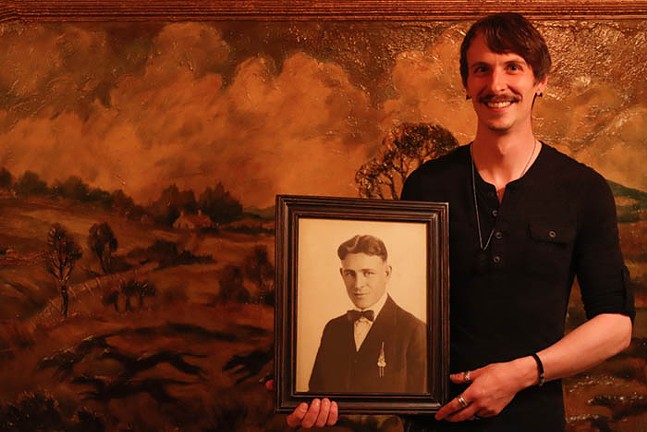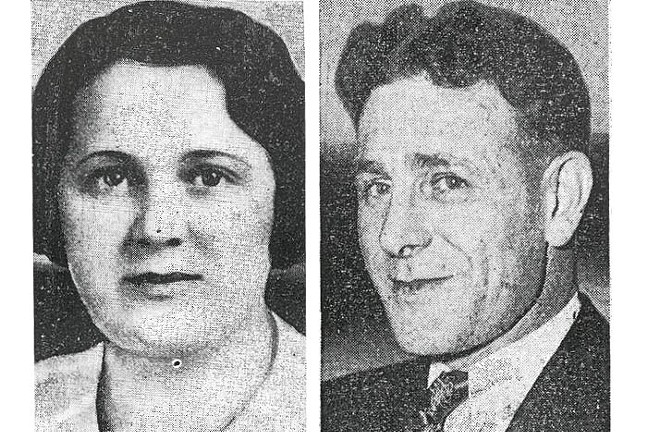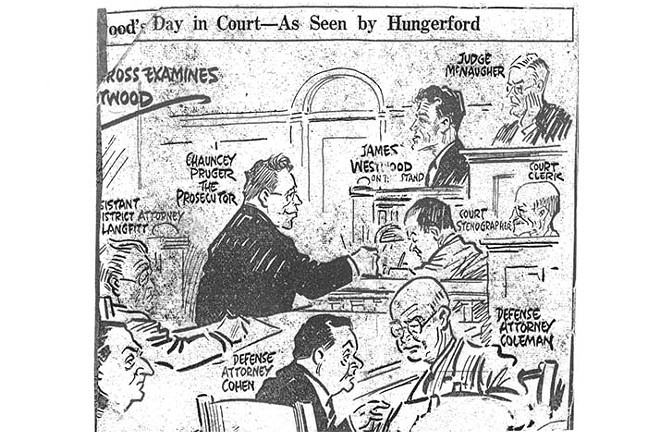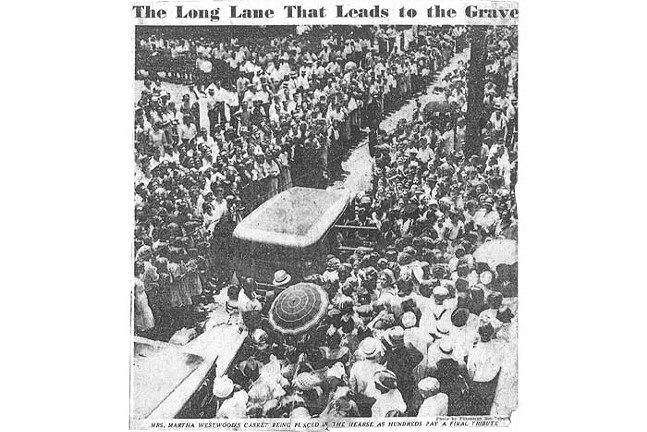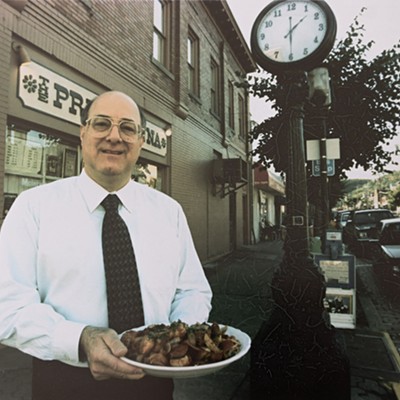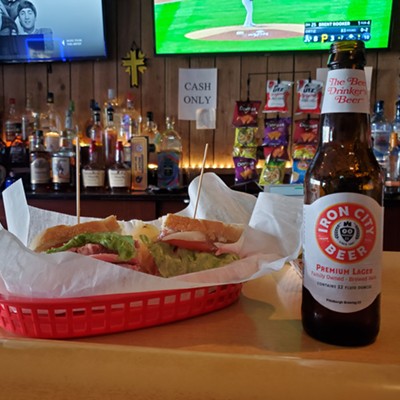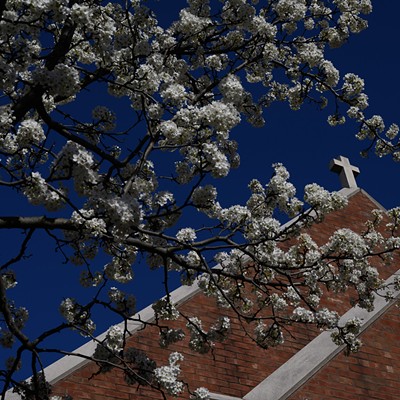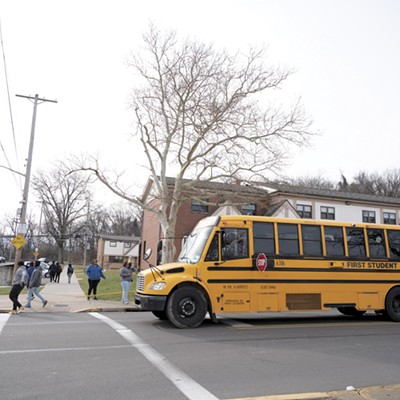Ryan Westwood was printing copies at the Father Ryan Arts Center in McKees Rocks, where he’d recently taken a job as a childrens’ theater assistant, when he spotted Vicki Batcha looking for assistance at the empty front desk. He went over to help, and was trying to connect her with the center’s director of development, when her eyes locked on to his nametag.
Could he be related to the infamous justice of the peace convicted in 1936 of killing his wife?
Batcha helps lead the McKees Rocks Historical Society, and her mind was flush with details about the domestic slaying from a haunted tour they’d recently given. She had to at least ask.
Westwood, 36, had grown up in Pittsburgh’s Brookline neighborhood and didn’t know much about the aging mill town he now worked in. But he knew from a high school family history project that his great-grandfather, James Westwood, had been involved in McKees Rocks politics and died while imprisoned. It seemed to line up.
“So you know all about the curse of the kick and everything else surrounding the murder?” responded Batcha.
Westwood confessed he didn’t. He suspected his parents shielded him from the goriest aspects when he probed his ancestry as a teenager. Batcha followed up and later handed him a binder brimming with newspaper clippings about the investigation and trial that captivated the public in the months after Martha Westwood’s murder.
Now, four years after that fateful encounter, Westwood and his husband Shawn live in a converted funeral home less than a mile from where his great-grandmother was gunned down in bed. Last month, he spoke about her death and the trial during one of the historical society’s monthly meetings at Mickey’s Place in neighboring Kennedy Township.
“I don’t know if I’ll ever get any final answers at this point,” he told the group of about 30. “There are a lot of unanswered questions that I'm still working on.”
The couple
James and Martha Westwood were variously feared and revered by the people of McKees Rocks. As justice of the peace — the office prefiguring today’s magisterial judges — James determined people’s fates before the eyes of the law, and was known as someone to avoid crossing.
In an age when women were seen primarily as homemakers, less is known about Martha, but she was renowned for her looks and poise. They had four children, Bertha, Martha, Jimmy Jr., and Clara, who died from an accidental gunshot wound in 1932. Whatever may have existed of a happy domestic life was shattered for the Westwoods when Martha was gunned down in the early hours of July 10, 1935.
Whodunnit?
Accounts of what happened that day were shrouded in mystery from the outset.
Anna Sehar, a neighbor, told the Pittsburgh Press she heard three shots ring out around 1:50 a.m. Per the article, “She looked out of the window and saw a man lurking in the shadows of the Clay Alley houses.”
By this point, she had secretly scribbled a note in her prayerbook identifying Westwood as the killer. “If something happens to me, you know it was Westwood,” it read. But she later told the court she had refrained from naming him at the time out of fear. Instead, she described the assailant as “tall” and “long-haired,” while Westwood, once a featherweight amateur boxer, had short hair and was notoriously diminutive.
The Press also noted, and prosecutors eagerly repeated, how the family dog “Buddy … did not bark, although the killer apparently climbed an outside flight of 16 stairs to reach the porch from which he fired.”
The alibi
About 50 minutes after Martha’s fatal shooting, her husband showed up at the scene with a constable and a county detective, claiming the trio were preparing to embark on a twilight fishing trip when the call came in. Before driving to Brookline to pick up the detective, Westwood claimed he attended a floor show at a roadhouse in Robinson Township with Constable Timothy Drexler and two “party girls” named Catherine Cole and Peggy Moran Belmas. Before this, the group said, they visited a hotel bar in Carnegie where Westwood had sought out a special mineral water that he believed would soothe his stomach ailments.
Westwood admitted to leaving the roadhouse for a 30-minute interval, but he claimed he spent that time in his car with Belmas. She originally vouched for him, but later retracted her statement. Detectives began to punch other holes in his elaborate alibi, and took time to assure reluctant neighbors to speak out against the powerful justice of the peace. James was finally arrested about six weeks after the murder. Still, he insisted he was innocent.
In the months that followed, regional newspaper readers lapped up daily reports on one of the most gripping true crime sagas of the era.
Intrigue piqued in September when a key witness for the state was mysteriously crushed by an industrial press at a factory where he worked in Coraopolis. An inquest conducted after Westwood’s conviction ruled the death accidental, though suspicion around the cause of death remained. Another witness died of a heart attack, while yet another was hospitalized by a car crash on the way to court.
When the trial began in January 1936, the courthouse corridors “thronged with spectators hopeful of forcing their way into the jammed interior of the courtroom,” according to a report from the long-defunct Pittsburgh Sun-Telegraph.
Westwood convicted
The jury deliberated for nearly 24 hours before returning a guilty verdict. Sehar’s testimony proved instrumental in the conviction, as did an innovative paraffin wax test that supposedly proved Westwood fired a gun shortly before the murder. The judge’s admission of the novel test as evidence set a precedent in courtrooms across the country lasting into the 1960s.
Bruce Boni, a magisterial justice for McKees Rocks and Stowe, and Westwood’s modern-day successor, found himself captivated by the case after reading a serialized interpretation of the story several years ago in the Pittsburgh Post-Gazette.
“It’s this fascinating historical tidbit that was apparently the talk of the town and the country,” Boni tells Pittsburgh City Paper. “It’s funny that to some degree it was lost to history.”
As well as settling people’s fates in the courtroom, Westwood was a known political powerbroker with contacts reaching throughout Allegheny County. At the time of his murder trial, he was appealing a conviction of voter fraud that had brought down a web of prominent Pennsylvania Republicans. Westwood was also a known associate of bootlegger Ed Cerceo, who reportedly entertained Al Capone in his McKees Rocks hotel after the mobster’s 1930 release from Eastern State Penitentiary.
Boni, who grew up on the neighborhood’s Island Avenue above his parents’ now-shuttered floral shop, says the glamor and gore of the 1930s underworld reflects just one side of a community forged mostly by civic minded workers.
“A lot of the people who came here were hard-working blue collar workers,” Boni says. “They were just focused on doing the best they could for their families. And there was a parallel world going on at the same time with people who had more power and influence and money. What is fascinating to me is ... some of the supposed witnesses who brought down this figure were working class folks.”
No parole
Appeals filed by Westwood’s lawyers made it up to the Pennsylvania Supreme Court, but the justices scoffed at his claims of a mistrial.
“In a painstaking examination of this voluminous record, we have found no reversible error,” the court’s opinion maintained. “The evidence sustains the jury's conclusion that the appellant perpetrated this shocking crime.”
Westwood sought parole but was twice denied before his death in 1951. He maintained his innocence throughout.
Boni says the Westwood story offers a reminder to people of influence who might be tempted to exploit their position.
“The bottom line is he committed a very serious crime,” Boni says. “I guess the lesson that you learn is regardless of position, regardless of influence, everybody should be treated equally in the eyes of the law.”
Family misfortune
The web of mystery and intrigue surrounding Martha’s murder was not contained to just that event. Instead, it ensnared the Westwood family for many years before and after Martha’s gruesome death.
In February 1932, the Westwoods’ youngest daughter, Clara, died from a gunshot wound inflicted by her father’s pistol. The story accepted by the coroner was that the young child had been playing with the gun in bed and accidently shot herself.
Six months later, Martha Westwood’s parents died at home from mortal gun wounds in what was ruled a murder-suicide. James Westwood, who lived in the apartment below, found the bodies.
Westwood was sentenced to life in prison at the former Western Penitentiary, which still looms over the egg-shaped peninsula of the McKees Rocks Bottoms where the Westwoods lived. He fell to his death while working from a scaffold during a painting job on the prison’s stoney exterior. One year later, his son Jimmy Westwood Jr. died from a fall at a construction site near the family home where Martha was slain.
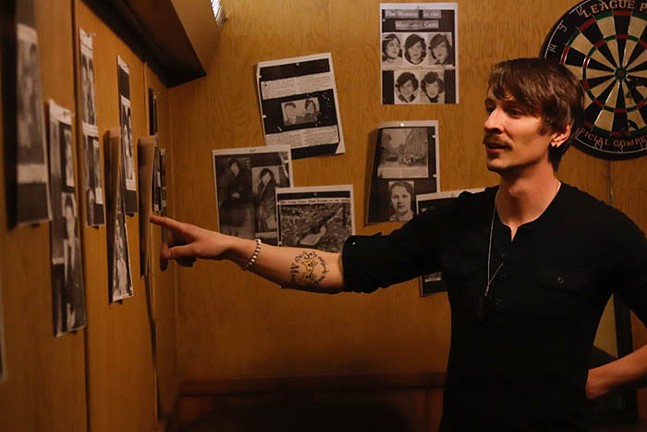
Redeeming a legacy
More than 85 years after his great grandmother’s death, Ryan Westwood isn’t entirely sure how to process this part of his family’s story.
He’s confident, though, that talking about it openly can somehow bring about good. And he knows he has nothing to feel ashamed of.
“I'm related to it, but it's not my story, so why not talk about it?” he says during an interview with City Paper. “I just think it's a fascinating story. I think that's what happens instantly as people share their stories, and I feel like with the work I do with social work and just connecting with people that it’s so important to share and talk about mental health.”
The opportunity for buying the former Anthony M. Musmanno funeral home to live in and establish a multi-purpose community hub presented itself to Westwood and his husband a few years after he began working in McKees Rocks. Since 2021, they’ve been pushing ahead with some ambitious renovations and are preparing to unveil a series of arts and gardening programming over the coming months as they formally open “the Castle.”
Weighing his plans for the community against his family’s legacy, Westwood senses the hand of destiny.
“I think it's one of those things where [I felt] like I was meant to be here. Like, I just happened to come, and now knowing that I have that connection here is very motivating,” Westwood says. “We always were saying with the space that, you know, it was originally a place that was healing life as a doctor's office, and it was a place that was celebrating life [as a funeral home]. And now we're creating, renewing, and bringing new life into this space.”
Read more about James Westwood and "the curse of the kick"
Reproduced historical photos from the McKees Rocks Historical Society were originally sourced from Pittsburgh Post-Gazette, Pittsburgh Sun-Telegraph, and Pittsburgh Press

